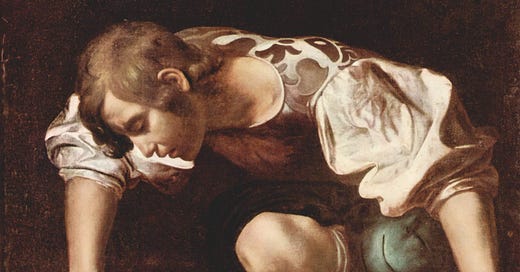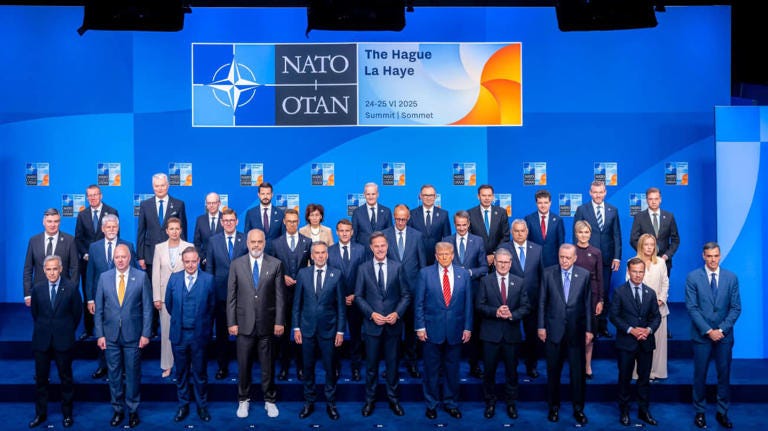I know that I promised that my next article would be a ‘what we can do to sort it out’ one following my last depressing analysis of the state of the world. I had to get this one off my chest first!
Our ancestors, back before we went sedentary, had social measures in place that actively stopped anyone becoming The Leader. One reason was surely that it’s impossible for anyone to be omnicompetent. Another was most likely an understanding that collective decision making is better adapted at helping a group survive, multiple points of view rather than one. It’s also fragile, having one leader means little or no redundancy, what happens if that person dies? 200,000 years or so of experience isn’t to be taken lightly, our ancestors worked out how best to survive and thrive and for the most part it was without leaders.
Since then we have built up a very different social, cultural and political soil from which spring our leaders. Here’s a photo of a bunch of them at the 2025 Hague summit of defence, bless their little cotton socks.
In the title I speak of the ‘end of humanity’, I’m not talking about Humanity but humanity as in: understanding and kindness towards other people.
Grandiose narcissism, or grandiosity,
This is a personality trait characterized by an inflated sense of self-importance and a lack of empathy for others. It’s associated with a sense of entitlement, a thirst for dominance, a strong desire for admiration and a tendency to seek status and recognition. People with grandiosity tendencies also have big problems about ‘exclusion’, "Our findings suggest that individuals with higher levels of narcissism are more sensitive to exclusion cues, leading them to perceive ostracism more frequently." Having noticed what they interpret as exclusion they then tend to react more aggressively to try and counter it.
What would characterise a grandiose narcissistic leader?
This is what Wikipedia has to say:
The person exaggerates talents, capacity, and achievements in an unrealistic way.
The person believes in their invulnerability or does not recognize their limitations.
The person has grandiose fantasies.
The person believes that they do not need other people.
The person over-examines and downgrades other people's projects, statements, or dreams in an unrealistic manner.
The person regards themself as unique or special when compared to other people.
The person regards themself as generally superior to other people.
The person behaves self-centeredly and/or self-referentially.
The person behaves in a boastful or pretentious way.
None of these characteristics would seem adapted et enabling someone to be an effective and compassionate leader. In fact it would probably be best to excluded anyone exhibiting these traits from any position of power. We seem to have done the opposite.
Being a leader means you get power and influence, this is very attractive for a narcissist. You get involved with high-stakes decision making which is attractive and feeds narcissism. You get a lot of media exposure which narcissists love.
How would a grandiose narcissistic leader tend to behave?
They tend to be ambitious and driven with strong desire for power and recognition, and they are willing to take risks to achieve their goals.
They tend to emphasise their ‘personal brand’ and use their personal stories and image to promote their policies and agenda.
They tend to use bombastic language, act self-aggrandizing behavior, and show a great need for admiration.
They prioritizes their own interests and image over the needs and well-being of others. They exhibit a lack of empathy and accountability. They try and project an imùage of a cult-like personality.
Politically they will tend to promote the centralisation of power, feeling that it they who have all the answers. They manage using a top-down approach without sufficient consultation or input from other stakeholders. They tend to surround themselves with sycophants.
They love symbolism and rhetoric feeling that they are more important than substance and policy.
They prefer a lack of transparency and accountability so they create systems that allow them to cover things up, hide them away or delete them.
Is any of this ringing any bells? Can you recognise all or some of these traits in our global leaders?
Another major problem with these people is their insatiable need for power and recognition. This means they tend to get blown along by the political wind coming from the ‘People’. If they feel that the ‘People’ are moving to the right, then they head right and vice-versa.
One of the things they know full well is that in times of crisis people tend to want to stick to the known and avoid change. Better the devil you know etc. The ideal situation for grandiose narcissist is one in which a crisis is followed by another. If there isn’t an actual crisis then it’s relatively easy to create one. Of course, some crises work better than others. You may have noticed some of this going on if you follow the news.
Climate change and environmental destruction were the crises at the heart of Van der Leyen’s ‘new green deal’. She and her supporters told us again and again that we face an existential crisis. They started to meet a lot of resistance from industrial lobbies and farmers. They also noticed that the ‘People’ were starting to buy into the industry polemic that green measures hurt the poor and cost jobs.
War is a far more potent crisis than some difficult to see and understand environmental break-down. The wind had changed and Ursula and her friends decided to go into full war crisis mode. Environmental policies are being watered down, delayed and cancelled. Funds are being diverted to defence. Trump’s demand that they boost defence spending or else he’ll stop supporting them was, for them, a far greater existential crisis than climate break-down. After all it meant that their positions of power were under threat. Clinging to power by any means equals having few qualms about abandoning the Planet in order to concentrate on pushing a war/defence narrative. They have noticed how war has meant that Zelensky has gone from being a simple head of state to become a major actor on the world stage. The grandiose narcissists want this for themselves.
War is less of a problem and more of an opportunity for a grandiose narcissist. They are, after all, in positions of power and so they, and their families, are, or will be, protected from the ravages of war. The lack of empathy associated with this psychological condition helps as they don’t feel the pain as others will.
Their only worry about a full blown war is that, in it’s aftermath, they may be swept out of power by the ‘People’. They learnt how Winston Churchill lost his position of power and was replaced by a progressist Labour Party. Attlee and company got busy creating things like the National Health Service, with nationalising the Bank of England and a whole bunch of industries. Shocking stuff that actually improved the quality of life for millions of people. The grandiose narcissists could look to Charles de Gaulle who managed to increase his power, unfortunately he and his government did a lot of nationalising too. Still, it gave way to a new society based on mass-consumption and the 30 glorieuses. Thirty years of sustained economic growth and rising standards of living.
Industrialists tend to despise nationalisation, they feel that it’s state sponsored robbery, they lose influence, wealth and power. It would be surprising if Ursula, her sycophants and industrial leaders were not working on a post-war plan to avoid a backlash from the ‘People’, especially nationalisation and regime change.
Back to the soil
A study done back in 2008 showed that narcissism was increasing amongst college students. It measured this as an increase of 30% from 1982 to 2006. Another study done in 2015 revealed that narcissistic personality traits, such as grandiosity and entitlement, had increased among young people in the United States over the past few decades. Yet another study showed that empathy levels have decreased among young people in recent decades, which is a key characteristic of grandiose narcissism. Yup, these studies concentrated on US people but we are seeing similar rises around the world. One of the major reasons for this is the use of social media, platforms like Instagram, Facebook, and Twitter create a culture of self-promotion and competition, individuals feel pressured into presenting a perfect image and accumulate likes and followers.
Twenge and friends also point a finger at changes in parenting styles. They found that parents who overpraise and overindulge their children are more likely to contribute to the development of grandiose narcissism in them.
Increased wealth and materialism tends to create a sense of entitlement and grandiosity, particularly among young people who have grown up in affluent environments.
The above studies also point to a decline of traditional social norms and values and that this has contributed to the rise of narcissism and aggression.
None of this sound good, our current societies are encouraging the development of narcissists who will want positions of power and influence. This means they will tend to want to maintain the status quo but they’ll have to shake it up from time to time to make space for themselves. This means more crises, more U turns, more time and lives wasted.
Some may wonder about this article which ‘seems’ to suggest that most of our leaders are grandiose narcissists but if it looks like a duck, swims like a duck, and quacks like a duck, then it probably is a duck.
My interest in writing about this is that it provides further evidence to support the main arguments that you’ll find in my next article about what we can do.







Spot on. Disturbing cross over with some of the criteria for psychopathy. Also, New Scientist (sorry, can’t find the reference) carried a story on research showing that “leaders” who stayed in a position of authority for more than about three years developed increasingly self-centred behaviours, greater risk taking, relied more on their own impulses, stopped listening to other opinions and showed decreasing empathy.